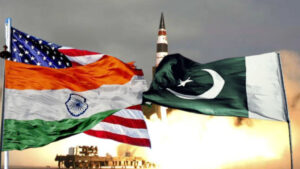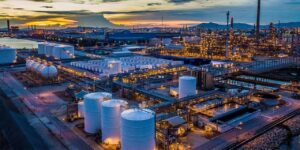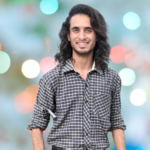From Roots to Resolution: Historical Landscape of the Palestine-Israel Conflict and its Suggested Solution “Reconciliation”

By Ahtisham Haider
In the 20th century, the world has reached the pinnacle of innovation, such as Morse code, message access in simple language, miles and months of travel in minutes, laborers replaced by machines, life has become easier and easier, by human development. It has reached such levels that without the natural system man has been able to create a man like himself. All these advancements in science were made in the nineteenth and twentieth centuries. If we take a detailed look at the twentieth century, we have killed millions of people in our own wars and completely changed this world for millions of newcomers.
The world went through great disasters like World War I and II in that century and then an organization was organized to maintain peace in the world, which was named the “United Nations” (UN). But there are two such black doors in the history of the world which are always pushing the world towards world war once again and the United Nations is still unable to find a solution to these two problems. Among these two-problems, the first problem is the “Palestine-Israel Conflict” while the second problem is the “Kashmir Conflict”, are also the main barriers in the way of “One World Order”.
In 2019, the entire world was gripped by a pandemic like the Coronavirus (COVID-19), which put the world on a new path, now the planet is rapidly moving towards the “digital world”. During this period, great efforts were made to solve these two major problems, in which they worked hard towards the possible solution of the Kashmir conflict, and some issues have been settled, almost maintaining peace, but on the other hand, The issue of “Palestine and Israel” was there, Before proceeding further to the issue of Palestine Conflict, I will look at its complete history.
We will discuss when the world was ruled by the Ottoman Empire, Palestine also came under this great empire. The majority of Muslims lived here, who were Arabs, but Jews and Christians also lived there, since this place is very important for all three religions and is called the holiest place, so during the Ottoman Empire, people of all three religions lived there peacefully. That they used to perform their religious duties happily while living together. But both the Arab Muslims and the Jews were not happy with the rule of the Ottoman Empire and on their own both had written letters to Britain, the enemies of the Ottoman Empire.
Along with this, it is also necessary to state that the Jews were treated very badly all over the world during that period, they were oppressed and tortured every day and their great religious leaders were killed because the Christians, It was believed that they were the Jews because of which Jesus was hanged, because of which they always hated the Jews. Theodor Herzel, a Jewish political leader from Palestine, wrote a book in 1886 called “Judenstaat” which means “Jews State” and laid the foundation for a movement called “Zionism”. In this movement, this political leader laid the foundation for the concept of a separate country for the Jews.
At the beginning of the 20th century, the Jews living in Palestine tried their best to convey their message to the whole world and to convince the Jewish people to emigrate to Palestine and build a new state there which would be purely for them. In 1917, the First World War began and within a short period of time, the regime of the Ottoman Empire seemed to be ending. On November 2, 1917, British Foreign Secretary “Arthur Balfour” wrote a letter to “Lord Rothschild”, the greatest leader of the Jews, in which he allowed the Jews to come to Palestine and create a new country. And all kinds of cooperation were also assured. This letter written by the British Rule proved to be the basis of the war that lasted for almost a century in the history of the world.
In December 1917, the British government ended the rule of the Ottoman Empire and took charge of Palestine and deployed its troops officially. At the same time, they began to fulfill the promise made to the Jews and laid the foundations of a separate Jewish state. At the same time, the Arab Muslims of Palestine launched a campaign against British rule, which was the reason for their resentment that they were not included in the decisions.
In 1919 “Author Balfour” wrote another memorandum explaining that he did not consider it necessary to respect the opinion of the Muslims of Palestine. And at the same time, Jews from all over the world were allowed to enter Palestine and the efforts to develop a Jewish state were completed. The Jews were also allowed to establish their own Army called the “Haganah”. As it was a time of change all over the world, people were moving from labor to factories, so many new schools and factories were established within the Jewish occupied area of Palestine.
For almost two decades, this system continued and the Arab Muslims remained silent, but in 1939, the Muslim Arab Palestinians declared an open rebellion, as a result of which the British rule oppressed them, imprisoned them, killed them and some were exiled, but when the movement continued to grow, a negotiating committee called the “Peel Commission” was appointed to resolve the conflict between Arab Muslims and Jews in Palestine, which the Muslims rejected and refused to accept.
In 1949, the British, seeing its failure, rejected the “Peel Commission” itself and launched a “White Paper” as a result of which the main points were as follows:
1. No more Jews were allowed to enter Palestine.
2. A ban was also imposed on the purchase of Arab Muslim lands for Jews.
3. Said to liberate Palestine within the next ten years.
With the publication of this White Paper, a war broke out between the Zionist Jews and the British Rule. The war of 1939 had not even begun when the world plunged into World War II and everyone’s eyes turned to this great war.
It was also World War II in which Hitler killed 6 million (six hundred thousands) Jews who lived in Europe, which has been called “The Holocaust”. Sixty-six percent (66%) of Jews living in European countries were killed in those four years (1941 – 1945), and those who survived fled to Palestine. And the White Paper could not be implemented into law. As the British Empire was exhausted by the Second World War, it abandoned Palestine and left “Palestine Conflict” to the United Nations “UN” in 1947.
Thus, this was the first problem that came to the United Nations which could not be solved. At that time, there were 6,30,000 Jewish settlements, 1,43,000 Christians and 11,81,000 Muslim Arabs living in this country of Palestine. A resolution was passed to divide the country into 55 percent (55%) to Jewish and remaining 45 percent (45%) of the land between Christians and Muslims, which has not been cleared by the United Nations till date. Although the newspapers of the period continued to tell the world that this decision was made on the strength of wealth, the Indian ambassador, who was then a member of the United Nations Assembly, claimed that a huge bribe was also offered to give, for a vote in Jews favor. Of course, the Arab Muslims refused to accept this apparently incomprehensible decision, but the Muslim Arab Palestinians still did not have the strength to fight the Haganah, a stable army of Jews.
On May 14, 1948, “David Ben-Gurion” declared the “State of Israel” and became the first prime minister. Many European countries accepted Israel and recognized the country, but none of any Arab countries recognized Israel. In 1948, five countries together imposed war on Israel. Israel is the Jewish state that declared itself as a state only a few months ago that fought this war and defeated all the five Arab countries. And when the war ended, Israel also “occupied territories that the United Nations had designated to Muslim Arabs, including Gaza and the West Bank.”
In 1967, these Arab countries made a second attempt and imposed war on Israel, but this time too Israel was victorious and even the West Bank and the nearby area of Egypt, were also taken over by Israel. The people of Israel decided to fight on their own and founded a liberation organization called the PLO “Palestine Liberation Organization”. In the beginning, the people of this organization took up arms, hijacked planes and ships and tried to get their point across, but Israel and the United States together declared this organization a terrorist organization and imposed various sanctions on them.
In 1974, the United Nations (UN) recognized the Palestine Liberation Organization (PLO) as the representative party of the Palestinians and the label of terrorism was lifted from them. In 1979, the “Peace Talks” between Egypt and Israel were concluded, as a result of which Israel returned the territories occupied to Egypt back and the two countries recognized each other as countries. The Jews have now expanded their exodus to the West Bank region of Palestinian Arab Muslims and in violation of the charter of the United Nations, they have forcibly occupied the Arab Muslim territories as well.
In 1992, when the “Peace Agreement” was reached between the “PLO and Israel”, Yasser Arafat, the representative leader of the Palestine Liberation Organization at that time, recognized Israel as a country, and the Israeli PM of that era, “Yitzhak Rabin”, recognized Palestine as a country. Palestine was identified by combining the territories of the Gaza and the West Bank, which were purely Arab Muslim territories. Yasser Arafat’s decision was not accepted by all Palestinians and thus Muslim Arab Palestinians were divided into two groups, one called PLO (Palestine Liberation Organization) and the other HAMAS. Similarly, a group of Jews Zionists on the other hand refused to accept the decision of their Prime Minister, but still the peace agreement was reached and the West Bank was once again divided into three parts.”A,B,C” where it’s stated that, A for PLO, B for Israel and C for Both of them. But the “Peace Agreement” was shattered when the Jews killed their own prime minister in 1995.
In 1996, the first elections were held in Palestine, which Hamas formally boycotted, and several suicide attacks were carried out in Israel. As a result, the situation became more tense. Because of this, the Arab Muslim Palestinians had to face many difficulties when Israel launched an operation against them and also made a concrete wall on the boundaries of the West Bank.
In 2006, Palestinian elections were once again held in which Hamas not only participated but also won, after which a civil war broke out between the PLO Palestinian Liberation Organization and Hamas, which resulted in Arab-Muslim Palestine being divided into two parts again. It was divided, with the West Bank being taken over by the PLO and the Gaza Strip being taken over by Hamas.
In the last two decades, this civil war has been controlled to some extent, but small wars between Palestine and Israel have always been going on. In 2014, 73-Israelis and 2,251-Palestinians were martyred in the “Israeli-Palestinian War”. Similarly, 183-Palestinians were martyred in 2018 and the whole world saw this cruelty when dead bodies of children were melting on the ocean bank of Gaza strip. Hamas and Israel many times dropped missiles on each other to create a scenario of civil war. In 2021, Hamas retaliated and almost forced Israel into war, but then the world force stopped the problem from escalating.
The current Prime Minister of Israel, Netanyahu, while addressing the United Nations General Assembly on September 22, 2023, said that we have prioritized establishing peace with the Arab countries and we will also establish peace with Palestine, but we want to inform the Palestinians rulers that they should stop saying that a man like Hitler was right, he was definitely wrong that he massacred the Jews. You must also avoid the thought of massacre of Jews. Along with this, he also accused the Palestinian party Hamas of being involved in the conspiracy to kill the US secretary with the help of Iran. And he further said that Iran is a terrorist country in the world which is also supporting Hamas and showing its eyes to a big power like America. He said that Iran is trying to intimidate Israel with its drone and missile program. Although the Iranian ambassador was not present during this part of his speech. Just 14 days after his speech, on October 7, 2023, Hamas once again fired (5,000) Five thousands rockets at once on Israel and declared war. More than three months have passed since the start of this war, and in the first month, 1,300 Israelis and more than 10,000 Palestinians have been martyred. As these days are increasing, the number of these bodies is also increasing, this war has been going on for three months and so far more than 25 thousand Palestinians have been martyred. Israel has done to the Gaza Strip what it once did to “Hiroshima and Nagasaki”, denying all basic necessities to the Palestinian people for the past three months. Electricity, water, bread, clothes and even medicines are not being allowed to reach Arab Muslim Palestinians. Instead of solving the problem head on, the world is slowly jumping into this war. The United States officially announced its support for Israel and is currently providing all military and basic supplies, while Iran and later Egypt and Jordan stand in support of Palestine.
The world is currently heading towards the third world war and the silence of the United Nation is still very sad!! A few officials who were in the United Nations and spoke about human rights resigned themselves and the world still relies on this organization. As all the countries are becoming a part of the war and two blocks are being seen again, it is possible that the third world war will start soon and destroy the world. The Palestinian Arab Muslims are still determined to fight the war and the Israelis are now just trying their best to eliminate them.The world has known and everyone believes that Israel did not impose a war on Gaza, but it is massacring the people of Gaza strip to end this generation as it stated in the “text book theory” of Genocide. It is clear that Hamas did not get the support it had hoped for when it attacked Israel, and Hamas is close to being badly defeated, but it is still fighting the war and does not want to lay down its arms. Although Hamas’s attack on Israel this time was very strong, which shook Israel, but because Israel is included in the list of developed countries and especially in terms of defense so It is not easy.
The time has come for the United Nations (UN) to come forward to correct the wrong decisions they have made to stop the massacre of human beings and immediately call for a ceasefire!!
At the same time, the joint organization of Islamic countries OIC “Organization of Islamic Cooperation” should have a delegation of the United Islamic countries immediately show their willingness for a ceasefire and convince the world that now is the time that three religions worshiping one God should now be prevented from fighting in the name of religion. The Palestine problem is the biggest problem in the world and is very serious, but it is not a problem that cannot be solved.
The United Nations has to play an important role in introducing a solution to this problem that cannot be rejected by the Palestinian Arab Muslims and Jews as well as Christians. Keeping in mind the sanctity of the holy places of the three religions and valuing them, their holy places should be handed over to them and they should be given freedom to perform all kinds of religious rituals, but the identity of this country as Israel or Palestine must be integrated, and “Peaceful State of UN” name should be declared by United Nation, which should carry out all the responsibilities of the country. By establishing peace in this country, facilities should be made available to people of all three religions and no one religion should be allowed to desecrate other religions.
This world was created for respected Human beings, that is “Ashraf al-Makhluqat” in terms of the Quran (the best creation of God). If we human beings will leave our devils away and adopt love while promoting humanity, then there will not be wars of hatred in the world, and these examples of peace and love. will be established, seeing which the one God of Jews, Christians and Muslims will praise and feel proud of making human being Ashraf al-Mukhaluqat.
This article describes the views of the Author only and has nothing to do with The Global Politico.

Ahtisham Haider

The Duality of U.S. Policy in South Asia
The recent U.S. sanctions on Pakistan’s missile program, coupled with unsubstantiated claims of its targeting the U.S., reflect a broader geopolitical strategy aimed at undermining Pakistan’s strategic autonomy while selectively favoring India’s missile advancements, thereby exacerbating regional power imbalances in South Asia.

The BRICS Challenge: Can 100% Tariffs Save the U.S. Dollar?
Trump’s 100% tariff threat on BRICS may backfire, accelerating de-dollarization, sparking trade wars, and undermining U.S. economic dominance globally.

Threat Towards Nuclear Safety and Security Amid Global Tensions
Global nuclear safety is increasingly at risk amid rising international tensions. While India and Pakistan exhibit restraint with nuclear infrastructure agreements, superpowers like the U.S. and Russia escalate conflicts by targeting strategic facilities. This disparity emphasizes the need for global nuclear safeguards to prevent potential catastrophes from intentional or accidental nuclear incidents.

The SCO Summit in Pakistan: Opportunity or Challenge?
The upcoming SCO Summit presents Pakistan with a crucial opportunity to enhance its global standing, but also significant challenges. Missteps in handling political instability or countering India’s narrative could backfire. To seize this moment, Pakistan must skillfully manage relations with key players like China, Iran, and Russia while diplomatically addressing India’s criticisms. A well-crafted, strategic approach is essential to turning these challenges into long-term foreign policy gains for the country.

Indian Occupied Jammu and Kashmir Elections 2024: A Mere Façade?
The article argues that 2024 elections in Indian Illegally Occupied Jammu and Kashmir are seen as a façade, aimed at diverting the region’s freedom movement amid ongoing human rights violations and central government control following the abrogation of Articles 370 and 35A.

Industry, Innovation and Infrastructure: Building A Foundationally Sound Pakistan
This article investigates Pakistan’s position within Sustainable Development Goal (SDG) 9, “Industry, innovation and infrastructure.” It explores Pakistan’s in developing a robust industrial base, fostering innovation and establishing a sustainable infrastructure network. Through key government initiatives like “Digital Pakistan” and the National Transport Policy, Pakistan’s role maintaining its commitment to SDG 9 is highlighted. Additionally, it explores the potential challenges in addition to their possible solutions that Pakistan face in its journey to Goal 9.

